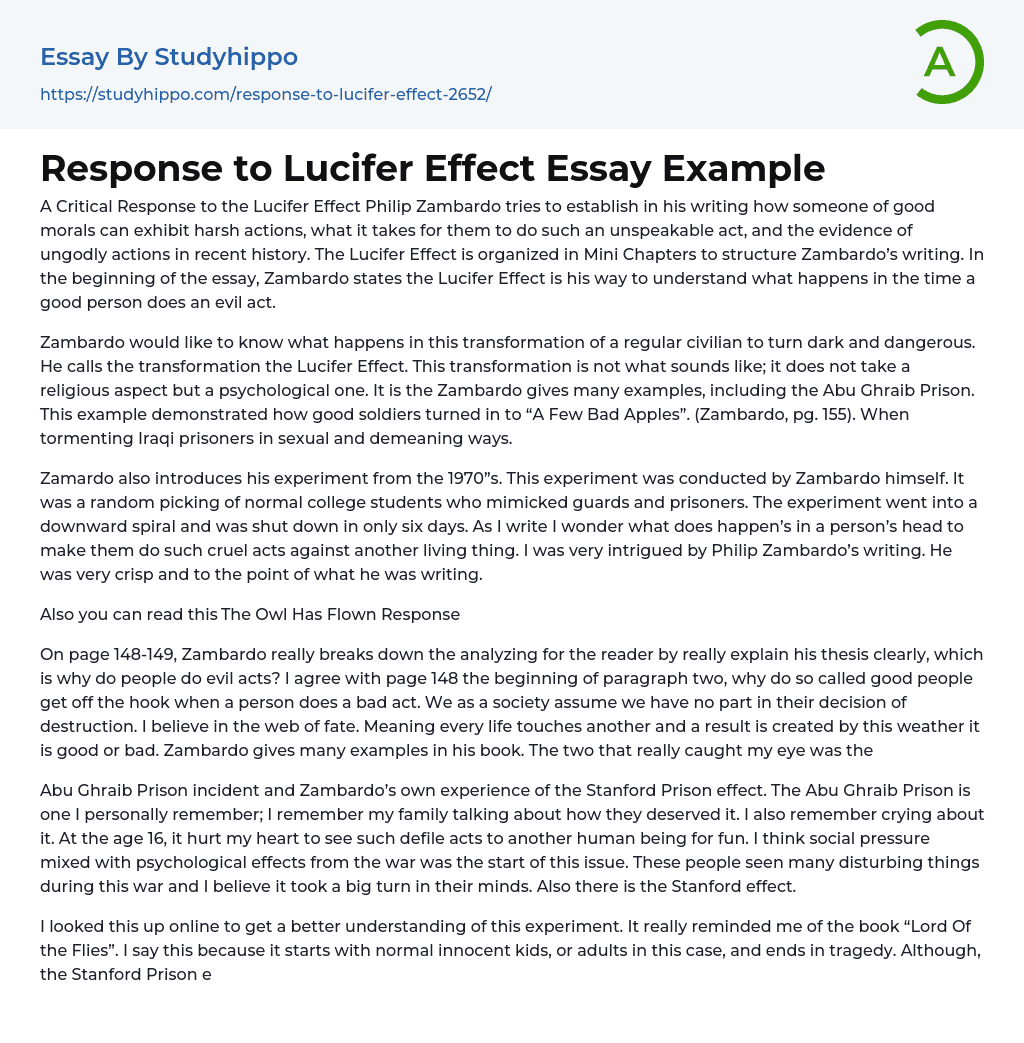In his writing, Philip Zambardo attempts to address the issue of how individuals with good morals can engage in harsh actions and what factors contribute to such unspeakable acts. Furthermore, he explores the evidence of ungodly actions in recent history. The organization of Zambardo's work, "The Lucifer Effect," is comprised of mini chapters which provide structure to his ideas. Zambardo begins his essay by stating that the Lucifer Effect serves as a means for him to comprehend the events leading up to the moment a virtuous individual commits an evil act. Ultimately, he seeks to understand the transformation that occurs within an ordinary civilian, causing them to adopt a dark and dangerous persona.
He names this transformation the Lucifer Effect, which should not be interpreted in a religious sense but rather a psychological one. Zambardo provides numerous examples to i
...llustrate this, such as the Abu Ghraib Prison incident, where seemingly good soldiers became "A Few Bad Apples".
According to Zambardo (pg. 155), he conducted an experiment in the 1970s where he tormented Iraqi prisoners in sexual and demeaning ways.
The experiment involved selecting average college students to act as guards and prisoners. The experiment quickly went downhill and was terminated after only six days. I am curious about the psychological motivations behind such cruel behavior towards another being. I found Philip Zambardo's writing on this topic intriguing. He has a clear and concise writing style. You can also read his response in The Owl Has Flown Response on pages 148-149. Zambardo thoroughly explains his thesis, which explores the reasons behind people committing evil acts. I agree with his statement on page 148 at the beginning of the
second paragraph, questioning why supposedly good individuals are not held accountable for their wrongdoings.
As a society, we often neglect our involvement in their destructive decisions. I strongly believe in the concept of the web of fate, where each life influences others and ultimately generates consequences, whether positive or negative. Zambardo extensively illustrates this idea in his book.
Two events that stood out to me were the Abu Ghraib Prison incident and Zambardo's personal encounter with the Stanford Prison effect. The Abu Ghraib Prison incident is particularly memorable to me, as I recall my family discussing it and expressing the belief that the individuals involved deserved what happened to them. I also have a vivid memory of feeling deeply saddened by the situation, as witnessing acts of cruelty being inflicted on another human being purely for amusement deeply affected me at the age of 16.
The issue began with a combination of social pressure and psychological effects stemming from the war. These individuals witnessed numerous disturbing events during the war, resulting in a significant shift in their mentality. Additionally, the Stanford effect comes into play, which I researched online in order to gain a clearer understanding of this experiment. Interestingly, it strongly reminded me of the book "Lord Of the Flies".
The Stanford Prison experiment had a tragic outcome despite initially involving innocent adults. Although the experiment was abruptly halted due to an overwhelming situation, it remained compelling. I have thoroughly read Dr. Zambardo's report on the incident, and I strongly believe that external influences play a significant role in shaping an individual's psyche. During the experiment, both prisoners and guards effectively assimilated into their respective roles within
the prison system.
The text discusses how certain Guards in the experiment acted cruelly and enjoyed humiliating the prisoners. Some prisoners forgot they were part of an experiment and obediently followed all the rules. Zambardo, who was in charge of the experiment, also fully immersed himself in his role and lost sight of its purpose. The text argues that both the environment and people surrounding someone significantly influence their decision-making process. Ultimately, changes in one's surroundings can lead to a phenomenon called the Lucifer Effect, which affects individuals' behavior, whether it is showing off or blindly obeying orders. Initially, Zambardo presents concrete evidence supporting his claims but later reflects on these findings and provides answers to his own questions.
Sometimes, the text can be challenging to comprehend, but upon rereading it becomes intelligible. Ultimately, it pertains to individuals similar to myself who, when placed in stressful circumstances or unfamiliar surroundings, may become unsettling.
- Animal Cruelty essays
- Law Enforcement essays
- Juvenile Justice System essays
- Surveillance essays
- Forensic Science essays
- Crime Prevention essays
- Criminal Justice essays
- Criminology essays
- Drug Trafficking essays
- Juvenile Delinquency essays
- Organized Crime essays
- Penology essays
- Prison essays
- Property Crime essays
- Punishment essays
- Serial Killer essays
- Sexual Offence essays
- Victim essays
- Crime scene essays
- Punishments essays
- Charles Manson essays
- Juvenile Crime essays
- Piracy essays
- Stealing essays
- Gang essays
- Hate Crime essays
- Homicide essays
- Damages essays
- Murder essays
- Robbery essays
- Ted Bundy essays
- Prostitution essays
- Violent crime essays
- Rape essays
- Identity Theft essays
- Sexual Harassment essays
- Distracted Driving essays
- Drunk Driving essays
- Detention essays
- Sexual Assault essays
- Sexual Assault on College Campuses essays
- Cyber Crime essays
- White Collar Crime essays
- Fur essays
- Federal Bureau Of Investigation essays
- Fire Department essays
- Criminal Justice System essays
- Commitment essays
- Mass Incarceration essays
- Kill essays




